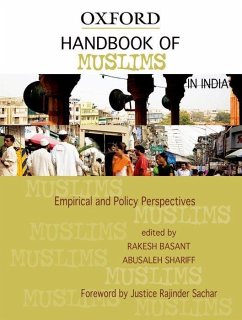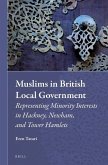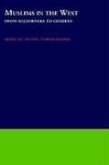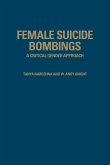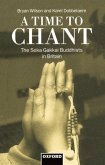Rakesh Basant / Abusaleh ShariffEmpirical and Policy Perspectives
Handbook of Muslims in India
Empirical and Policy Perspectives
Herausgeber: Basant, Rakesh; Shariff, Abusaleh
Rakesh Basant / Abusaleh ShariffEmpirical and Policy Perspectives
Handbook of Muslims in India
Empirical and Policy Perspectives
Herausgeber: Basant, Rakesh; Shariff, Abusaleh
- Gebundenes Buch
- Merkliste
- Auf die Merkliste
- Bewerten Bewerten
- Teilen
- Produkt teilen
- Produkterinnerung
- Produkterinnerung
Examining the status of Muslims in contemporary India, this handbook discusses their socio-historical background, analyses their demographic, educational and socio-economic conditions, and also looks at policy options to improve their condition.
Andere Kunden interessierten sich auch für
![Muslims in British Local Government Muslims in British Local Government]() Eren TatariMuslims in British Local Government171,99 €
Eren TatariMuslims in British Local Government171,99 €![Muslims in the West Muslims in the West]() Yvonne Yazbeck HaddadMuslims in the West109,99 €
Yvonne Yazbeck HaddadMuslims in the West109,99 €![Female Suicide Bombings Female Suicide Bombings]() Tanya NarozhnaFemale Suicide Bombings101,99 €
Tanya NarozhnaFemale Suicide Bombings101,99 €![Identity and Political Participation Among Young British Muslims Identity and Political Participation Among Young British Muslims]() A. MustafaIdentity and Political Participation Among Young British Muslims41,99 €
A. MustafaIdentity and Political Participation Among Young British Muslims41,99 €![Identity and Political Participation Among Young British Muslims Identity and Political Participation Among Young British Muslims]() A. MustafaIdentity and Political Participation Among Young British Muslims41,99 €
A. MustafaIdentity and Political Participation Among Young British Muslims41,99 €![Islam in the West Islam in the West]() Islam in the West54,99 €
Islam in the West54,99 €![A Time to Chant A Time to Chant]() Bryan WilsonA Time to Chant63,99 €
Bryan WilsonA Time to Chant63,99 €-
-
-
Examining the status of Muslims in contemporary India, this handbook discusses their socio-historical background, analyses their demographic, educational and socio-economic conditions, and also looks at policy options to improve their condition.
Hinweis: Dieser Artikel kann nur an eine deutsche Lieferadresse ausgeliefert werden.
Hinweis: Dieser Artikel kann nur an eine deutsche Lieferadresse ausgeliefert werden.
Produktdetails
- Produktdetails
- Verlag: Hurst & Co.
- Seitenzahl: 368
- Erscheinungstermin: 25. Februar 2010
- Englisch
- Abmessung: 244mm x 185mm x 25mm
- Gewicht: 794g
- ISBN-13: 9780198062059
- ISBN-10: 0198062052
- Artikelnr.: 28109374
- Herstellerkennzeichnung
- Libri GmbH
- Europaallee 1
- 36244 Bad Hersfeld
- gpsr@libri.de
- Verlag: Hurst & Co.
- Seitenzahl: 368
- Erscheinungstermin: 25. Februar 2010
- Englisch
- Abmessung: 244mm x 185mm x 25mm
- Gewicht: 794g
- ISBN-13: 9780198062059
- ISBN-10: 0198062052
- Artikelnr.: 28109374
- Herstellerkennzeichnung
- Libri GmbH
- Europaallee 1
- 36244 Bad Hersfeld
- gpsr@libri.de
Rakesh Basant is Professor of Economics, Indian Institute of Management, Ahmedabad.
* List of Tables; List of Figures; Contributors; Foreword (Rajinder
Sachar)
* 1.: Introduction (Rakesh Basant and Abusaleh Shariff); Section
I-Socio-Historical Context;
* 2.: Indo-Islamic Thought and Issues of Religious Co-existence (Irfan
Habib);
* 3.: On the Making of Muslims in India Historically (Satish Saberwal);
* Section II-Socio-economic Status;
* 4.: How do Indian Muslims Fare on Social Indicators? (Anil B.
Deolalikar)
* 5.: The Muslim Population of India-A Demographic Portrayl (P.M.
Kulkarni)
* 6.: Religion and Childhood Death in India (Sonia Bhalotra, Christine
Valente and Arthur van Soest)
* 7.: Social Divisions in Education in India (Sonia Bhalotra and
Bernarda Zamora); Section III-Employment and Labour Market;
* 8.: Risk Associated With Belonging to Disadvantaged Groups and Labour
Market Outcomes in India-A Bayesian Analysis (Vani K. Borooah)
* 9.: Informality and Gender in the Labour Market for Muslims in India:
Has Education Been a Route Out of Poverty? (Jeemol Unni)
* 10.: Earnings Inequality in India: Has the Rise of Caste and Religion
Based Politics in India had an Impact (Sumon K. Bhaumik and Manisha
Chakrabarty)
* 11.: Economic of Religion: Spiritual Capital and Philanthropy amongst
Muslims in India (Abusaleh Shariff); Section IV-Policy Implications
* 12.: Unequal Playing Field: Socio-Religious Inequalities in
Educational Attainment in India (Sonalde Desai and Veena Kulkarni)
* 13.: Is Positive Discrimination a Good Way to Aid Disadvantaged
Communities? (Thomas Weisskopf)
Sachar)
* 1.: Introduction (Rakesh Basant and Abusaleh Shariff); Section
I-Socio-Historical Context;
* 2.: Indo-Islamic Thought and Issues of Religious Co-existence (Irfan
Habib);
* 3.: On the Making of Muslims in India Historically (Satish Saberwal);
* Section II-Socio-economic Status;
* 4.: How do Indian Muslims Fare on Social Indicators? (Anil B.
Deolalikar)
* 5.: The Muslim Population of India-A Demographic Portrayl (P.M.
Kulkarni)
* 6.: Religion and Childhood Death in India (Sonia Bhalotra, Christine
Valente and Arthur van Soest)
* 7.: Social Divisions in Education in India (Sonia Bhalotra and
Bernarda Zamora); Section III-Employment and Labour Market;
* 8.: Risk Associated With Belonging to Disadvantaged Groups and Labour
Market Outcomes in India-A Bayesian Analysis (Vani K. Borooah)
* 9.: Informality and Gender in the Labour Market for Muslims in India:
Has Education Been a Route Out of Poverty? (Jeemol Unni)
* 10.: Earnings Inequality in India: Has the Rise of Caste and Religion
Based Politics in India had an Impact (Sumon K. Bhaumik and Manisha
Chakrabarty)
* 11.: Economic of Religion: Spiritual Capital and Philanthropy amongst
Muslims in India (Abusaleh Shariff); Section IV-Policy Implications
* 12.: Unequal Playing Field: Socio-Religious Inequalities in
Educational Attainment in India (Sonalde Desai and Veena Kulkarni)
* 13.: Is Positive Discrimination a Good Way to Aid Disadvantaged
Communities? (Thomas Weisskopf)
* List of Tables; List of Figures; Contributors; Foreword (Rajinder
Sachar)
* 1.: Introduction (Rakesh Basant and Abusaleh Shariff); Section
I-Socio-Historical Context;
* 2.: Indo-Islamic Thought and Issues of Religious Co-existence (Irfan
Habib);
* 3.: On the Making of Muslims in India Historically (Satish Saberwal);
* Section II-Socio-economic Status;
* 4.: How do Indian Muslims Fare on Social Indicators? (Anil B.
Deolalikar)
* 5.: The Muslim Population of India-A Demographic Portrayl (P.M.
Kulkarni)
* 6.: Religion and Childhood Death in India (Sonia Bhalotra, Christine
Valente and Arthur van Soest)
* 7.: Social Divisions in Education in India (Sonia Bhalotra and
Bernarda Zamora); Section III-Employment and Labour Market;
* 8.: Risk Associated With Belonging to Disadvantaged Groups and Labour
Market Outcomes in India-A Bayesian Analysis (Vani K. Borooah)
* 9.: Informality and Gender in the Labour Market for Muslims in India:
Has Education Been a Route Out of Poverty? (Jeemol Unni)
* 10.: Earnings Inequality in India: Has the Rise of Caste and Religion
Based Politics in India had an Impact (Sumon K. Bhaumik and Manisha
Chakrabarty)
* 11.: Economic of Religion: Spiritual Capital and Philanthropy amongst
Muslims in India (Abusaleh Shariff); Section IV-Policy Implications
* 12.: Unequal Playing Field: Socio-Religious Inequalities in
Educational Attainment in India (Sonalde Desai and Veena Kulkarni)
* 13.: Is Positive Discrimination a Good Way to Aid Disadvantaged
Communities? (Thomas Weisskopf)
Sachar)
* 1.: Introduction (Rakesh Basant and Abusaleh Shariff); Section
I-Socio-Historical Context;
* 2.: Indo-Islamic Thought and Issues of Religious Co-existence (Irfan
Habib);
* 3.: On the Making of Muslims in India Historically (Satish Saberwal);
* Section II-Socio-economic Status;
* 4.: How do Indian Muslims Fare on Social Indicators? (Anil B.
Deolalikar)
* 5.: The Muslim Population of India-A Demographic Portrayl (P.M.
Kulkarni)
* 6.: Religion and Childhood Death in India (Sonia Bhalotra, Christine
Valente and Arthur van Soest)
* 7.: Social Divisions in Education in India (Sonia Bhalotra and
Bernarda Zamora); Section III-Employment and Labour Market;
* 8.: Risk Associated With Belonging to Disadvantaged Groups and Labour
Market Outcomes in India-A Bayesian Analysis (Vani K. Borooah)
* 9.: Informality and Gender in the Labour Market for Muslims in India:
Has Education Been a Route Out of Poverty? (Jeemol Unni)
* 10.: Earnings Inequality in India: Has the Rise of Caste and Religion
Based Politics in India had an Impact (Sumon K. Bhaumik and Manisha
Chakrabarty)
* 11.: Economic of Religion: Spiritual Capital and Philanthropy amongst
Muslims in India (Abusaleh Shariff); Section IV-Policy Implications
* 12.: Unequal Playing Field: Socio-Religious Inequalities in
Educational Attainment in India (Sonalde Desai and Veena Kulkarni)
* 13.: Is Positive Discrimination a Good Way to Aid Disadvantaged
Communities? (Thomas Weisskopf)

